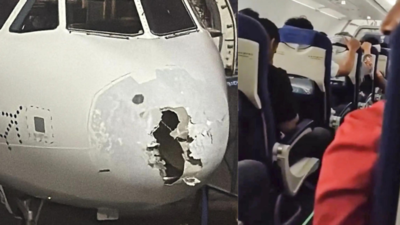Pakistan refused to bail out IndiGo flight hit by sudden hailstorm | India News

NEW DELHI: The pilot of IndiGo’s Delhi-Srinagar flight on Wednesday requested permission from Lahore ATC to briefly enter Pakistan airspace to escape turbulence after being caught in a sudden hailstorm.Sources said Lahore ATC denied the request, prompting the Airbus A321 pilot to declare an emergency with Srinagar ATC.The flight, carrying over 220 passengers, including Trinamool MPs, landed safely in Srinagar, but not without damage – the aircraft’s radome, or nose cone, was left badly battered by the storm.A senior official from Directorate General of Civil Aviation (DGCA) said, “We’ve asked IndiGo for a detailed report and a probe is underway. The aircraft (VT-IMD) remains grounded in Srinagar. The pilots are being praised for their presence of mind and professionalism in ensuring everyone’s safety.”IndiGo, in an official statement, said: “Flight 6E 2142 from Delhi to Srinagar on May 21 encountered a sudden hailstorm and landed safely at Srinagar International Airport. All passengers were well attended to upon landing and no injuries were reported. The aircraft is undergoing inspection and maintenance, and will resume service once it receives the necessary clearances.”Although Pakistan airspace is shut for Indian carriers, aviation experts argue that emergency requests like the one made by the IndiGo pilot should not be refused in the interest of passenger safety.Window shades must remain shut during take-off, landing at defence airports: DGCAAviation regulator DGCA has directed commercial airlines and charter and private jet operators to ensure aircraft window shades, barring those for emergency exit-row seats, are closed during take-off and landing at defence airports, “particularly those near the western border”.The rule is meant to “enhance operational safety and prevent unintentional sharing of security-related information by general public/crew”. Failure to comply will invite legal action, DGCA said.Pakistani drone and missile attacks in the aftermath of Operation Sindoor led to 32 airports in north, central and western India — including defence airbases with civil enclaves in Srinagar, Jammu, Leh, Amritsar, Chandigarh, Gwalior and Hindon — being shut for a few days. While operations at these airports have resumed, security concerns remain. “These instructions shall apply post opening of Indian airspace for commercial operations to all scheduled, scheduled commuter, and non-scheduled aircraft operating from defence airfields. All passenger window shades, where applicable, shall remain closed until the aircraft is airborne and has crossed an altitude of 10,000 feet during departure, or during arrival, after it descends below 10,000 feet and reaches the parking bay at the civil terminal,” the order states. In normal circumstances, safety protocol mandates all window shades remain open during take-off and landing. This is to ensure passengers and crew can assess external conditions, such as fires or debris, and identify exits in case of an emergency evacuation. DGCA order for civilian operations at defence airfields also bars photography.




